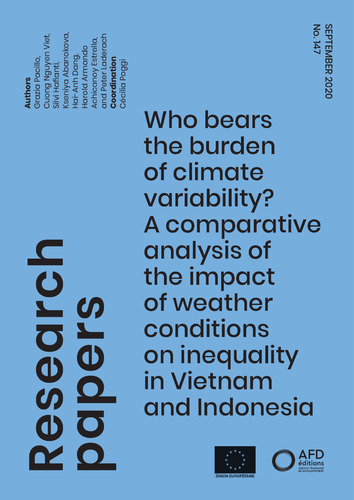Who bears the burden of climate variability? A comparative analysis of the impact of weather conditions on inequality in Vietnam and Indonesia
Is climate variability regressive?
One argument could be as
follows: People living in areas
with high risk of climate
hazards usually correspond
to the most disadvantaged
populations. Due to existing
structural inequalities, they
have limited opportunities to
cope with climate hazards and
often fall into a spiral of further
poverty and social exclusion.
In this paper, we investigate
whether climate variability
indeed has a regressive effect
in Vietnam and Indonesia
where both climate variability
and inequality have been
increasing. We directly analyse
the effect of annual and
seasonal temperature on
income and income inequality
across years. We do so by
looking at the Vietnamese
and Indonesian populations as
a whole and also investigating
more in-depth how these
impacts change for the most
vulnerable and marginalised
groups. Our results suggest that
climate variability increases
inequality and that its biggest
burden is bore by existing
vulnerable groups. In Indonesia,
these groups are rural, farming,
low educated, female headed
households, whose income
is significantly reduced
because of changes in climate
conditions. Similarly, in Vietnam,
ethnic minorities, rural, farming,
and agricultural households
bear the biggest impact of
climate variability. Interestingly,
some households in Vietnam
are able to completely offset
short-term impact of climate
variability, using remittances
and transfer as an insurance,
but our findings also show that
their coping strategy does not
withstand longer term impacts
of persistent climate variability. Despite the remarkable efforts
of the national governments
in supporting most vulnerable
and marginalised groups in the
Vietnamese and Indonesian
societies in the past decades,
specific interventions are
needed to address the needs
of those who are still bearing
the biggest burden of climate
impacts to finally allow even
the “last mile” groups to escape
poverty and exclusion.

